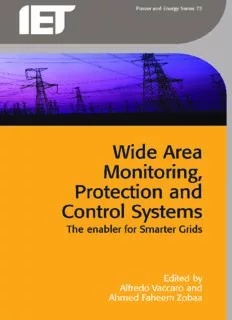
Wide area monitoring, protection and control systems: the enabler for smarter grids PDF
Preview Wide area monitoring, protection and control systems: the enabler for smarter grids
IET POWER AND ENERGYSERIES 73 Wide Area Monitoring, Protection and Control Systems Othervolumesinthisseries: Volume1 PowerCircuitBreakerTheoryandDesignC.H.Flurscheim(Editor) Volume4 IndustrialMicrowaveHeatingA.C.MetaxasandR.J.Meredith Volume7 InsulatorsforHighVoltagesJ.S.T.Looms Volume8 VariableFrequencyACMotorDriveSystemsD.Finney Volume10 SF6SwitchgearH.M.RyanandG.R.Jones Volume11 ConductionandInductionHeatingE.J.Davies Volume13 StatisticalTechniquesforHighVoltageEngineeringW.HauschildandW.Mosch Volume14 UninterruptiblePowerSuppliesJ.PlattsandJ.D.StAubyn(Editors) Volume15 DigitalProtectionforPowerSystemsA.T.JohnsandS.K.Salman Volume16 ElectricityEconomicsandPlanningT.W.Berrie Volume18 VacuumSwitchgearA.Greenwood Volume19 ElectricalSafety:aguidetocausesandpreventionofhazardsJ.MaxwellAdams Volume21 ElectricityDistributionNetworkDesign,2ndEditionE.LakerviandE.J.Holmes Volume22 ArtificialIntelligenceTechniquesinPowerSystemsK.Warwick,A.O.Ekwueand R.Aggarwal(Editors) Volume24 PowerSystemCommissioningandMaintenancePracticeK.Harker Volume25 Engineers’HandbookofIndustrialMicrowaveHeatingR.J.Meredith Volume26 SmallElectricMotorsH.Moczalaetal. Volume27 AC-DCPowerSystemAnalysisJ.ArrillagaandB.C.Smith Volume29 HighVoltageDirectCurrentTransmission,2ndEditionJ.Arrillaga Volume30 FlexibleACTransmissionSystems(FACTS)Y-H.Song(Editor) Volume31 EmbeddedgenerationN.Jenkinsetal. Volume32 HighVoltageEngineeringandTesting,2ndEditionH.M.Ryan(Editor) Volume33 OvervoltageProtectionofLow-VoltageSystems,RevisedEditionP.Hasse Volume36 VoltageQualityinElectricalPowerSystemsJ.Schlabbachetal. Volume37 ElectricalSteelsforRotatingMachinesP.Beckley Volume38 TheElectricCar:Developmentandfutureofbattery,hybridandfuel-cellcars M.Westbrook Volume39 PowerSystemsElectromagneticTransientsSimulationJ.ArrillagaandN.Watson Volume40 AdvancesinHighVoltageEngineeringM.HaddadandD.Warne Volume41 ElectricalOperationofElectrostaticPrecipitatorsK.Parker Volume43 ThermalPowerPlantSimulationandControlD.Flynn Volume44 EconomicEvaluationofProjectsintheElectricitySupplyIndustryH.Khatib Volume45 PropulsionSystemsforHybridVehiclesJ.Miller Volume46 DistributionSwitchgearS.Stewart Volume47 ProtectionofElectricityDistributionNetworks,2ndEditionJ.GersandE.Holmes Volume48 WoodPoleOverheadLinesB.Wareing Volume49 ElectricFuses,3rdEditionA.WrightandG.Newbery Volume50 WindPowerIntegration:ConnectionandsystemoperationalaspectsB.Foxetal. Volume51 ShortCircuitCurrentsJ.Schlabbach Volume52 NuclearPowerJ.Wood Volume53 ConditionAssessmentofHighVoltageInsulationinPowerSystemEquipment R.E.JamesandQ.Su Volume55 LocalEnergy:DistributedgenerationofheatandpowerJ.Wood Volume56 ConditionMonitoringofRotatingElectricalMachinesP.Tavner,L.Ran,J.Penmanand H.Sedding Volume57 TheControlTechniquesDrivesandControlsHandbook,2ndEditionB.Drury Volume58 LightningProtectionV.Cooray(Editor) Volume59 UltracapacitorApplicationsJ.M.Miller Volume62 LightningElectromagneticsV.Cooray Volume63 EnergyStorageforPowerSystems,2ndEditionA.Ter-Gazarian Volume65 ProtectionofElectricityDistributionNetworks,3rdEditionJ.Gers Volume66 HighVoltageEngineeringTesting,3rdEditionH.Ryan(Editor) Volume67 MulticoreSimulationofPowerSystemTransientsF.M.Uriate Volume68 DistributionSystemAnalysisandAutomationJ.Gers Volume69 TheLighteningFlash,2ndEditionV.Cooray(Editor) Volume70 EconomicEvaluationofProjectsintheElectricitySupplyIndustry,3rdEditionH.Khatib Volume72 ControlCircuitsinPowerElectronics:Practicalissuesindesignandimplementation M.Castilla(Editor) Volume74 PowerElectronicConvertersandSystems:Frontiersandapplications A.M.Trzynadlowski(Editor) Volume75 PowerDistributionAutomationB.Das(Editor) Volume76 PowerSystemStability:Modelling,analysisandcontrolB.OmP.Malik Volume78 NumericalAnalysisofPowerSystemTransientsandDynamicsA.Ametani(Editor) Volume79 Vehicle-to-Grid:LinkingelectricvehiclestothesmartgridJ.LuandJ.Hossain(Editors) Volume86 AdvancesinPowerSystemModelling,ControlandStabilityAnalysisF.Milano(Editor) Volume905 PowerSystemProtection,4volumes Wide Area Monitoring, Protection and Control Systems The enabler for Smarter Grids Edited by Alfredo Vaccaro and Ahmed Faheem Zobaa The Institution ofEngineeringand Technology PublishedbyTheInstitutionofEngineeringandTechnology,London,UnitedKingdom TheInstitutionofEngineeringandTechnologyisregisteredasaCharityinEngland& Wales(no.211014)andScotland(no.SC038698). †TheInstitutionofEngineeringandTechnology2016 Firstpublished2016 ThispublicationiscopyrightundertheBerneConventionandtheUniversalCopyright Convention.Allrightsreserved.Apartfromanyfairdealingforthepurposesofresearch orprivatestudy,orcriticismorreview,aspermittedundertheCopyright,Designsand PatentsAct1988,thispublicationmaybereproduced,storedortransmitted,inany formorbyanymeans,onlywiththepriorpermissioninwritingofthepublishers,orin thecaseofreprographicreproductioninaccordancewiththetermsoflicencesissued bytheCopyrightLicensingAgency.Enquiriesconcerningreproductionoutsidethose termsshouldbesenttothepublisherattheundermentionedaddress: TheInstitutionofEngineeringandTechnology MichaelFaradayHouse SixHillsWay,Stevenage Herts,SG12AY,UnitedKingdom www.theiet.org Whiletheauthorsandpublisherbelievethattheinformationandguidancegiveninthis workarecorrect,allpartiesmustrelyupontheirownskillandjudgementwhenmaking useofthem.Neithertheauthorsnorpublisherassumesanyliabilitytoanyoneforany lossordamagecausedbyanyerrororomissioninthework,whethersuchanerroror omissionistheresultofnegligenceoranyothercause.Anyandallsuchliabilityis disclaimed. Themoralrightsoftheauthorstobeidentifiedasauthorsofthisworkhavebeen assertedbytheminaccordancewiththeCopyright,DesignsandPatentsAct1988. BritishLibraryCataloguinginPublicationData AcataloguerecordforthisproductisavailablefromtheBritishLibrary ISBN978-1-84919-830-1(hardback) ISBN978-1-84919-831-8(PDF) TypesetinIndiabyMPSLimited PrintedintheUKbyCPIGroup(UK)Ltd,Croydon To Michelle Contents Preface xi 1 Widearea measurementsystem: the enabler for smarter transmissiongrids 1 1.1 WAMS: definition and constitutive sub-processes 2 1.1.1 WAMSdata resource 2 1.1.2 WAMScommunication systems 6 1.1.3 WAMSapplications/functionalities 7 1.2 Italian WAMSarchitecture and functionalities 10 1.3 WAMSdata classification 13 1.4 Preprocessingsynchronized phasor measurement data for power system analyses 15 References 16 2 Reliability-based substationmonitoring systemsplacement 19 2.1 Substation monitoring system 22 2.1.1 Monitoring system components 22 2.1.2 Branch PMU 23 2.1.3 Substation configuration 23 2.1.4 Substation communication system 24 2.2 Substation monitoring system reliability 25 2.2.1 Failure probability of voltage measurement 26 2.2.2 Failure probability of current measurement 27 2.3 SMSplacement based onbus reliability 28 2.4 Reliability-basedsubstation monitoring system placement considering transmission line outages 29 2.5 Evaluation of reliability-based SMSplacement 31 2.6 Numerical studies 33 2.6.1 Reliability-basedPMUplacement in the WSCC 3-machine, 9-bussystem 34 2.6.2 Reliability-basedPMUplacement in the IEEE 57-bustest system 35 2.6.3 Reliability analysisof the monitoring systems in the IEEE 9-bus test system 37 2.6.4 Reliability analysisof the monitoring systems in the IEEE 57-bus test system 38 2.7 Conclusions 39 References 41 viii Wide areamonitoring, protection and control systems 3 Systemintegrity protectionscheme basedonPMU technology 45 3.1 Introduction 45 3.2 Smart transmission grid 47 3.2.1 Demandsand requirements 47 3.3 SIPS–in general 48 3.4 Wide area disturbances 49 3.5 SIPSarchitecture 51 3.5.1 Design 52 3.5.2 Multipurpose open SIPSarchitecture 56 3.5.3 SIPScomponents 63 3.6 SIPSdata archival system 65 3.6.1 Real-time database 66 3.6.2 DASarchitecture 67 3.7 SIPSapplications 68 3.8 Data protocols 69 3.8.1 Field data acquisition protocols 70 3.8.2 Mixing protocols 71 3.9 SIPSmonitoring and testing functions 71 3.9.1 Testing facilities 71 3.9.2 Monitoring and condition-based maintenance (CBM) 72 3.9.3 Configurationmanagement 74 3.10 Example of SIPSapplication based onPMUtechnology 75 3.10.1 Operational and influence analysis of WPPon the EPS 75 3.10.2 Problemsregarding WPP Vratarusa 76 3.10.3 N-1Analysisregarding the specific disturbances in EPS 76 3.10.4 Conceptual design of automatic control and monitoring 77 3.10.5 System architecture overview 80 References 82 4 Newmethodologies for large-scale power system dynamic analysis 85 4.1 Introduction 85 4.2 Dynamic model 90 4.3 Eigenvalues and eigenvectors 93 4.4 Necessary conditions for DVSequilibrium tracing 97 4.5 Optimization-based model for equilibrium tracing 101 4.6 Iterative algorithms for DVStracing 103 4.6.1 Predictor–corrector-based algorithm 103 4.6.2 Interval bisection-based algorithm 105 4.6.3 Q–V Sensitivity 105 4.7 Dynamic analysiswith topology control(TC)optimization 106 4.7.1 DVSAssessment 107 4.7.2 Small-signal stability analysis 107 4.7.3 Optimization of eigenvalues movement 111 Contents ix 4.8 Illustrative test results 113 4.8.1 Small-scale (New England) 39-bus,46-branch and 10-generator test system 114 4.8.2 Large-scale real-world (PJM)13709-bus,18285-branch and 2532-generator test system 119 References 130 5 Afuzzy-baseddatamining paradigm for on-line optimal powerflow analysis 135 5.1 Introduction 135 5.2 Problem formulation 137 5.2.1 Optimal power flow analysis 137 5.3 The proposed approach 140 5.3.1 F-transform: an overview 141 5.3.2 The offline stage 143 5.3.3 The online stage 144 5.4 Simulation results 146 5.5 Conclusive remarks 153 References 154 6 False datainjection attacks andcountermeasuresfor wide area measurement system 159 6.1 Introduction 159 6.2 Preliminaries of SE 161 6.2.1 Nonlinear SE 161 6.2.2 DCstate estimation 161 6.2.3 Bad data detection 162 6.3 Framework of FDIAonDC SE 162 6.3.1 Generic linear measurement model 162 6.3.2 Generic FDIAonthe proposed linear measurement model 163 6.4 Framework of FDIAonAC SE 165 6.4.1 Perfect FDIAonAC SE 165 6.4.2 Practical FDIAonACSE 166 6.5 Proposedmeasurement consistency check-based FDIA detection method 168 6.5.1 Robust Huber-estimator forpower system 169 6.5.2 Proposedstatistical test-based FDIAdetection method 170 6.6 Simulation results 171 6.6.1 Detection of FDIAonDC SE 172 6.6.2 Detection of FDIAonAC SE 173 6.7 Conclusions 175 References 176 Index 179
